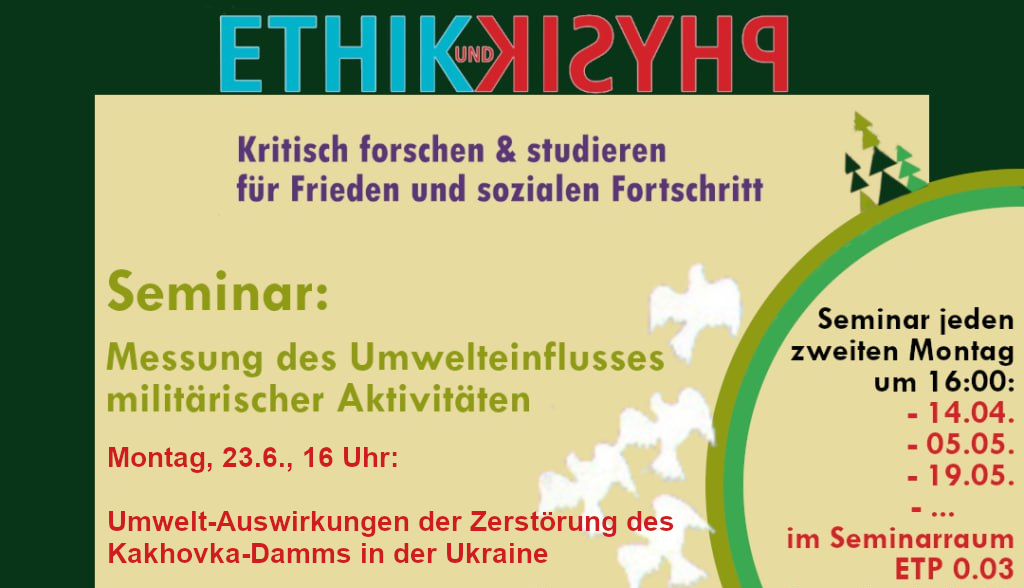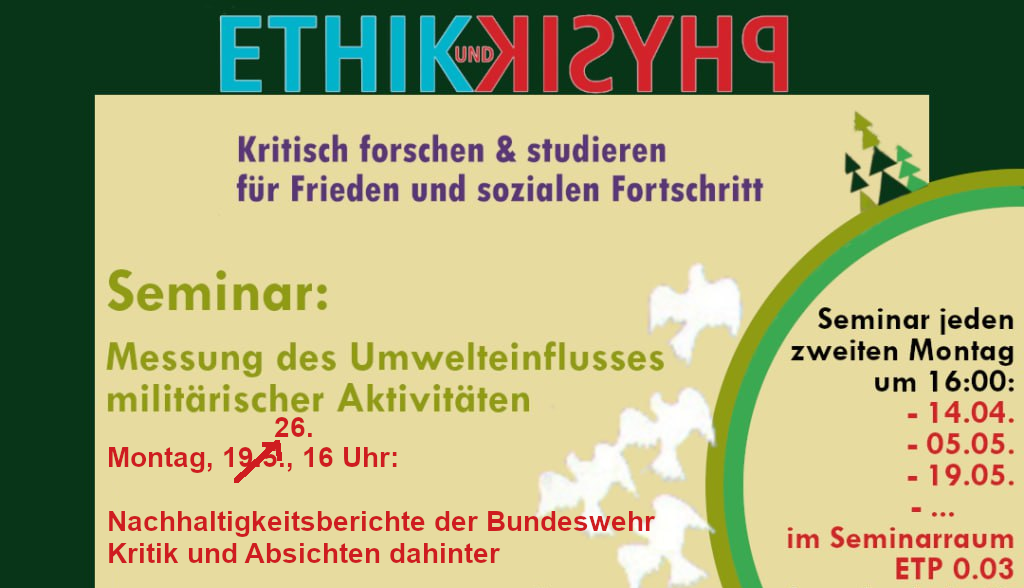Physik & Ethik: Umwelt-Auswirkungen der Zerstörung des Kakhovka-Damms in der Ukraine


Die Auseinandersetzung um wissenschaftliche Fortschritte und ihre gesellschaftlichen Auswirkungen wird immer dringender. Wir leben in einer Zeit, in der sich der Widerspruch zwischen affirmativer und kritischer Wissenschaft zuspitzt. Immer mehr stellt sich die Frage, ob Wissenschaft der Legitimation des Bestehenden und insbesondere der bestehenden Machtstrukturen zuarbeitet oder eben diese Machtstrukturen infrage stellt und dem Allgemeinwohl verpflichtet ist. Wir wollen gemeinsam diskutieren, wo sich das in der Kölner Physik zeigt, was die Ursachen sind und Möglichkeiten erarbeiten, die Physik zu einer kritischen Wissenschaft zu gestalten.
Deshalb veranstalten wir dieses Semester wieder zusammen mit Dozierenden die Veranstaltungsreihe „Physik & Ethik: Kritisch forschen & studieren für Frieden und sozialen Fortschritt“.
Montags um 16 Uhr finden abwechselnd ein Seminar zur Messung des Umwelteinflusses militärischer Aktivitäten (jeweils im ETP) und unsere Werkstatt, bei der der Schwerpunkt noch mehr als beim Seminar darauf liegt, mit den Erkenntnissen einzugreifen (jeweils im Foyer an der Fahne) statt.
Die Diskussion war in diesem Semester bisher sehr davon geprägt, sich den nicht ganz so offensichtlichen Aspekten der Zerstörung durch die sich immer skrupelloser zuspitzenden Kriege zu stellen. Auch wurde die Rolle der Wissenschaft im Globalen Norden angesichts der hiesigen, zunehmend auf Blockbildung zur Aufrechterhaltung imperialer Strukturen gerichteten Geopolitik diskutiert.
Allerdings haben sich die Diskussionen bisher vor allem darum gedreht, wie denn Wissenschaft nicht nicht Teil von Kriegspolitik und imperialer Blockbildung sein kann. Weil das Thema an sich spannend ist und sich hoffentlich auch eignet, um mehr zu der Frage zu kommen, was Wissenschaft denn in der Hand hat, um das Blatt zu wenden, wollen wir uns diese Woche an Hand ausgewählter Texte, zu denen Menschen Input vorbereitet haben beschäftigen mit:
Technologie- und Wissenschaftspolitik im Globalen Süden
| Wir, Studierende der Universität zu Köln, haben einen Offenen Brief an die Universitätsleitung initiiert. In diesem fordern wir die Rücknahme der Strafanträge gegen Protestierende (Studierende verschiedener Universitäten und Aktivist*innen), die im Sommer 2024 an einer friedlichen Blockade des Eingangs zum Hauptgebäude teilgenommen haben. Ziel des Protests war es, ein zuvor abgelehntes Gespräch über die Haltung und Rolle der Universität zum anhaltenden Krieg im Gazastreifen und die damit verbundene humanitäre Katastrophe, über Partnerschaften mit israelischen Universitäten, über die Ausladung Nancy Frasers und weitere fragwürdige Entscheidungen der Universität zu erwirken.
Unser Anliegen: Die Rücknahme der Strafanträge; für eine Universität, die als Ort des offenen Diskurses, der Wissenschafts-, Meinungs- und Versammlungsfreiheit und dem Auftrag, zu Frieden, Demokratie und Nachhaltigkeit in der Welt beizutragen, glaubwürdig bleibt. Unterstütze den Offenen Brief mit deiner Unterschrift. Ob von Gruppen, Lehrenden, Studierenden oder Externen – wir freuen uns über jede Unterschrift, denn als öffentliche Institution hat sich die Universität vor der Gesellschaft zu verantworten.
|
We, students at the University of Cologne, initiated an open letter to the rectorate. In this letter, we demand the withdrawal of the criminal charges against protesters (students from various universities and activists) who took part in a peaceful blockade of the entrance to the main building in summer 2024. The aim of the protest was to obtain a previously rejected conversation about the university’s stance and role in the ongoing war in Gaza and the associated humanitarian catastrophe, about partnerships with Israeli universities, about the disinvitation of Nancy Fraser and other questionable decisions by the university.
Our demand: The withdrawal of the criminal charges; for a university that remains credible as a place of open discourse, freedom of science, opinion and assembly and the mission to contribute to peace, democracy and sustainability in the world. Support the Open Letter with your signature. Whether from groups, teaching staff, students or external parties – we look forward to every signature, because as a public institution, the university has to answer to society. |
…
 Antifaschistische Lesungen zum 92. Jahrestag der Bücherverbrennung
Antifaschistische Lesungen zum 92. Jahrestag der Bücherverbrennung
Donnerstag, 5. Juni 2025, 11:00 bis 16:00 Uhr
Albertus-Magnus-Platz
Zum 92. Mal jährt sich im Mai die Verbrennung der Schriften von jüdischen, pazifistischen, bürgerlich-demokratischen, sozialistischen und kommunistischen Literatinnen und Literaten. Wir wollen aus den Werken dieser Autorinnen und Autoren lesen, deren Bücher von den Nazis verbrannt wurden, weil sie deren niedrigen und menschenverachtenden Zielen im Wege standen.
Wer mitlesen möchte, kann sich anmelden oder spontan vorbeikommen.

Tuesday, 27th of May, 16.00
(16.00 Coffee & Cake in the foyer, 16.30 talk & discussion)
Lecture Hall III
Where does the Periodic Table end, and what is the heaviest nucleus that can exist? Is there an „Island of Stability“ for superheavy elements? Answering these fundamental questions is central to superheavy element research. These elements do not occur naturally on Earth and can only be synthesized in small quantities using particle accelerators. For over 50 years, research at the GSI in Darmstadt has significantly expanded our understanding of these elusive species, leading to the discovery of six new elements. The GSI conducts a comprehensive research program that addresses every aspect of superheavy elements, using a wide range of specialized setups and techniques. Recently, several pioneering experiments have provided crucial insights into the nuclear shell structure of the heaviest nuclei, the reason for their very existence.
In his presentation, Michael Block will provide an overview of the status of the field and present highlights from recent measurement campaigns.

Tuesday, 27th of May, 16.00
(16.00 Coffee & Cake in the foyer, 16.30 talk & discussion)
Lecture Hall III
The application of magnetic fields is a commonly used instrument in materials- science research, since this allows to study, modify, and control the state of matter. Thereby, research at the highest possible magnetic fields becomes increasingly important.
This includes the investigation of frustrated magnetic materials and the determination of Fermi surfaces of topological and correlated metals by means of measurements of magnetic quantum oscillations. We further investigate unconventional high-magnetic-field states of novel superconductors, but, beyond that, even field-induced plasma waves in liquid metals.
Jochen Wosnitza from Helmholtz-Zentrum Dresden-Rossendorf will present a brief overview on the experimental infrastructure and discuss some highlights of the research at the Dresden High Magnetic Field Laboratory, with a focus on magnetically frustrated materials.

Auf Grund des Bahn-Wetters mussten wir letzte Woche spontan umplanen und hatten Vortrag und Diskussion zu den Konsequenzen des Gaza-Krieges für die Umwelt.
Deshalb holen wir das eigentlich für letzte Woche geplante Thema am 26.5. nach.